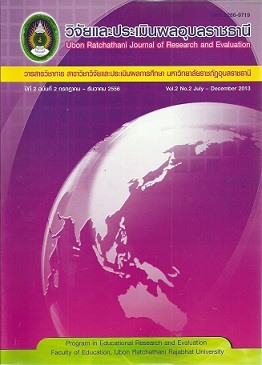Development of The Causal Model of Thai Traditional Medicine Students Competencies in Thai Qualifications Framework for Higher Education.
Keywords:
โมเดลเชิงสาเหตุ, สมรรถนะนักศึกษาแพทย์แผนไทย, กรอบมาตรฐานคุณวุฒิระดับอุดมศึกษาแห่งชาติAbstract
The objective of this research were to (1) study the competencies level of thai traditional medicine students in Thai Qualifications Framework for Higher Education. (2) Develop and validate the model of thai traditional medicine students in Thai Qualifications Framework for Higher Education with empirical data . (3) Study the direct effect, indirect effect and total effect combined influence of factors that affect the overall competencies of thai traditional medicine students in Thai Qualifications Framework for Higher Education. The samples used in this study is thai traditional medicine students in class year the 1-4 total of 400 people selected by multistage random sampling. The instrument used in the analysis consisted (1) general information (2) investigate the factors that affect the competencies of thai traditional medicine students is a five-rating scale. Factor consisted : Professional attitude, Achievement motivation, Perceived social support, Interaction with friend, Management of teaching and learning, Assessment practice, Environment in educational institutions and Learning resources. The confidence of the cronbach's Alpha was 0.831, 0.842, 0.911, 0.835, 0.947, 0.938, 0.724 and 0.919 respectively (3) Measure of competencies of thai traditional medicine students in Thai Qualifications Framework for Higher Education is five-rating scale with the confidence of both the equal 0.978 Cronbach's alpha. Statistical is used for analysis was frequency, percentage, mean, standard deviation, skewness, kurtosis, and pearson correlation coefficient. and confirmatory factor analysis (CFA), structural equation model (SEM) using Mplus version 6.12.
The results are summarized below :
- The mean scores of competencies of thai traditional medicine students in thai qualifications framework for higher education the overall at high level ( =3.69 ,S=.053). The moral power ethics has the highest average ( =4.00, S=.481). Thai traditional medical professional competencies has an average minimum ( = 3.54,S =.558).
- The causal model of thai traditional medicine students have developed in harmony with the empirical data with the =61.362, df=46, /df =1.333, p=0.0643, CFI = 0.992, TLI=0.984, RMSEA =0.029, SRMR=0.035.
- Factors directly effected to the competencies of thai traditional students in thai qualifications framework for higher education were student characteristics factor, teacher characteristics factor and learning environment factor. Learning environment factor has effected size 0.246 is statistically significant at .05 level.
- Factors indirectly effected to the competencies of thai traditional students in thai qualifications framework for higher education were teacher characteristics factor, learning environment factor through the student characteristics factor. Teacher characteristics factor has effected size 0.917 statistically significant at .01 level.
- Factors total effected were teacher characteristics factor 0.468 statistically significance at 0.01 level. followed. And learning environment factor were total effect 0.207 significant at .05 level. All factors can explain the variation of thai traditional medicine students competencies in Thai Qualifications Framework for Higher Education 40.3 percent.
References
การอุดมศึกษาแห่งชาติ, สำนักงานคณะกรรมการ. กรอบมาตรฐานคุณวุฒิระดับอุดมศึกษาแห่งชาติ พ.ศ. 2552 (Thai Qualifications Framework for Higher Education หรือ TQF : HEd) (ออนไลน์) 2554 (อ้างเมื่อ 19 สิงหาคม 2554) จาก http://www.mua.go.th/users/tqfhed/news/FilesNews/FilesNews2/news2. pdf
จินตนา ยูนิพันธ์. การเรียนการสอนทางการพยาบาล. กรุงเทพฯ: ภาควิชาพยาบาลศึกษา คณะครุศาสตร์ จุฬาลงกรณ์มหาวิทยาลัย, 2527.
ฑินกร โนรี. การศึกษาการวางแผนความต้องการผู้ให้บริการด้านการแพทย์แผนไทยของสถานบริการภาครัฐในทศวรรษหน้า (ปี พ.ศ.2551-2560). กรุงเทพฯ: สำนักงานพัฒนานโยบายสุขภาพระหว่างประเทศ, 2552.
ดวงเดือน พันธุมนาวิน. จิตวิทยาการปลูกฝังวินัยแห่งตน. กรุงเทพฯ: สถาบันวิจัยพฤติกรรมศาสตร์ มหาวิทยาลัยศรีนครินทรวิโรฒ, 2523.
ทองเรียน อมรัชกุล. การบริหารกิจการนิสิต : ทฤษฎีและแนวปฏิบัติ. กรุงเทพฯ: หน่วยศึกษานิเทศก์
กรมการฝึกหัดครู, 2525.
บุญเรียง ขจรศิลป์. วิธีวิจัยทางการศึกษา. พิมพ์ครั้งที่ 5. กรุงเทพฯ: พี.เอ็น.การพิมพ์, 2543.
พัฒนาการแพทย์แผนไทยและการแพทย์ทางเลือก, กรม. แผนยุทธศาสตร์ชาติการพัฒนาภูมิปัญญาไท สุขภาพดีวิถีไท ฉบับที่ 2 (พ.ศ.2555-2556). กรุงเทพฯ: อุษาการพิมพ์, 2555.
ภรณี เชาวกุล. ความสัมพันธ์ระหว่างปัจจัยส่วนบุคคล กิจกรรมการจัดการเรียนการสอนของอาจารย์พยาบาลและสภาพแวดล้อมของสถาบันกับสมรรถนะเชิงวิชาชีพของนักศึกษาพยาบาล วิทยาลัยพยาบาลสังดักกระทรวงสาธารณสุข. วิทยานิพนธ์พยาบาลศาสตรมหาบัณฑิต จุฬาลงกรณ์มหาวิทยาลัย, 2542.
วิจิตร วรุตบางกูร. การวางแผนผังและพัฒนาสถานศึกษา. กรุงเทพฯ: ภาควิชาบริหารการศึกษา มหาวิทยาลัย
ศรีนครินทรวิโรฒ ประสานมิตร, 2525
วิทย์ทิชัย พวงคำ. การพัฒนาโมเดลเชิงสาเหตุของความสามารถในการคิดวิเคราะห์ของนักเรียนมัธยมศึกษาตอนต้น. วิทยานิพนธ์ครุศาสตรมหาบัณฑิต จุฬาลงกรณ์มหาวิทยาลัย, 2551.
วิรุธน์ บัวงาม. การพัฒนาโมเดลเชิงสาเหตุของสมรรถนะนักศึกษาแพทย์แผนไทยตามกรอบมาตรฐานคุณวุฒิระดับอุดมศึกษาแห่งชาติ. วิทยานิพนธ์ครุศาสตรมหาบัณฑิต มหาวิทยาลัยราชภัฏอุบลราชธานี, 2556.
วิไล จัตตุวัฒนา. ปัจจัยส่วนบุคคล บรรยากาศองค์การ การสนับสนุนทางสังคมกับเชาว์อารมณ์ของหัวหน้าหอผู้ป่วยโงพยาบาลศูนย์ เขตภาคตะวันออก. ปริญญานิพนธ์พยาบาลศาสตรมหาบัณฑิต มหาวิทยาลัยบูรพา, 2549.
สถานพยาบาลและและการประกอบโรคศิลปะ, สำนัก. ประกาศรายชื่อสถาบันการศึกษาที่ผ่านการรับรองหลักสูตรแพทย์แผนไทยบัณฑิต. (ออนไลน์) 2555 (อ้างเมื่อ 3 สิงหาคม 2555) จาก http://www.scphpl.ac.th/home/images/stories/161_panthai.pdf
สุชาดา อินทรกำแหง ณ ราชสีมา. ปัจจัยที่ส่งผลต่อคุณภาพนักศึกษาพยาบาลในวิทยาลัยพยาบาล สังกัดสถาบันพระบรมราชชนก กระทรวงสาธารณสุข. ปริญญานิพนธ์การศึกษาดุษฎีบัณฑิต มหาวิทยาลัยนเรศวร, 2545.
สุวพร ตั้งสมวรพงษ์. “การพัฒนาบัณฑิตในยุคโลกาภิวัตน์ ในอุดมศึกษาในศตวรรษ์ที่ 21,” เอกสารสัมมนาทางวิชาการ. กรุงเทพฯ: พริ้นโพร, 2542
สุสุรางค์ โค้วตระกูล. จิตวิทยาการศึกษา. พิมพ์ครั้งที่ 8. กรุงเทพฯ: สำนักพิมพ์แห่งจุฬาลงกรณ์มหาวิทยาลัย, 2552.
อดุลย์ วิริยเวชกุล. ดัชนีบ่งชี้คุณภาพบัณฑิตศึกษาของสถาบันอุดมศึกษา. กรุงเทพฯ : พี.เอ.ลิฟวิ่ง จำกัด, 2541
เอกพจน์ สืบญาติ. การศึกษาความสัมพันธ์เชิงสาเหตุของปัจจัยที่มีอิทธิพลต่อพฤติกรรมการปฏิบัติการพยาบาลตามบทบาทวิชาชีพของนักศึกษาพยาบาลชั้นปีที่ 4 วิทยาลัยพยาบาลบรมราชชนนี. ปริญญานิพนธ์การศึกษามหาบัณฑิต มหาวิทยาลัยศรีนครินทรวิโรฒ, 2549.
Astin, Alexander W. The College Environment. Washington, D.C.: American Council on Education, 1968.
Downloads
Published
How to Cite
Issue
Section
License
1. บทความที่ตีพิมพ์ในวารสารนี้ได้มีการตรวจสอบการลอกเลียนงานวรรณกรรมแล้ว ไม่เกินร้อยละ 25
2. บทความที่ตีพิมพ์ในวารสารนี้เป็นข้อคิดเห็น ข้อค้นพบของผู้เขียนบทความ โดยผู้เขียนบทความต้องเป็นผู้รับผิดชอบต่อผลทางกฎหมายใด ๆ ที่อาจเกิดขึ้นจากบทความนั้น ๆ
3. บทความ ข้อมูล เนื้อหา รูปภาพ ฯลฯ ที่ได้รับการตีพิมพ์ในวารสารวิจัยและประเมินผลอุบลราชธานี ถือเป็นลิขสิทธิ์ของวารสารวิจัยและประเมินผลอุบลราชธานี หากบุคคลหรือหน่วยงานใดต้องการนำทั้งหมดไปเผยแพร่ต่อหรือเพื่อกระทำการใดๆ จะต้องได้รับอนุญาตเป็นลายลักษณ์อักษรจากวารสารวิจัยและประเมินผลอุบลราชธานีก่อนเท่านั้น และจะต้องมีการอ้างอิงวารสารวิจัยและประเมินผลอุบลราชธานี ฉบับนั้น ๆ ด้วย






